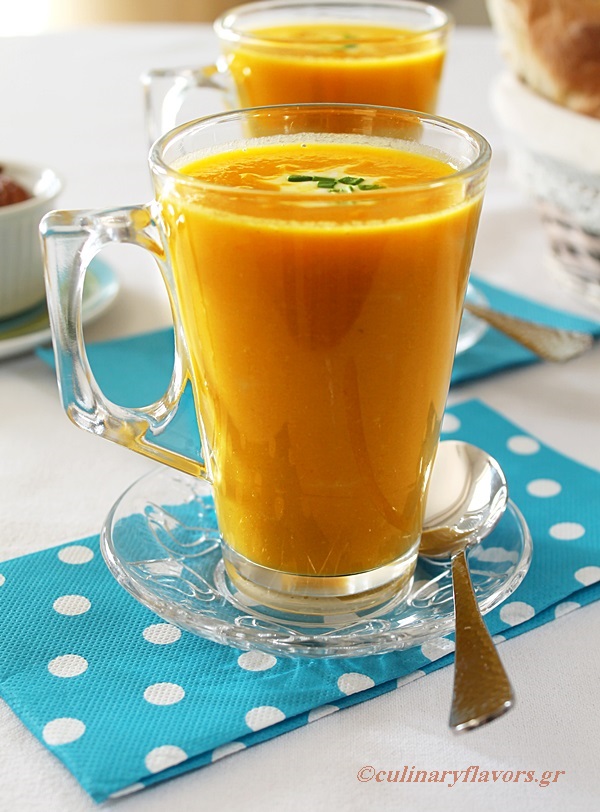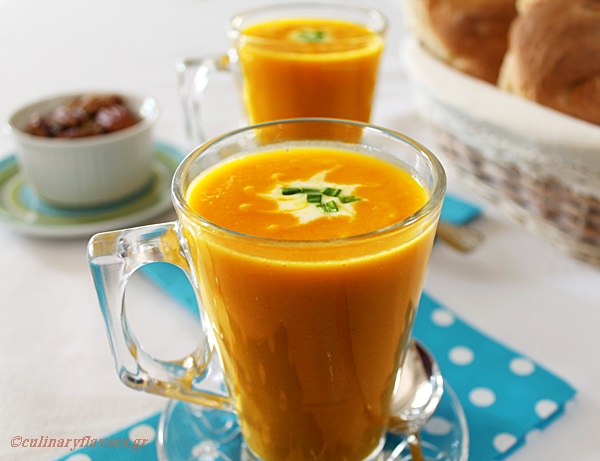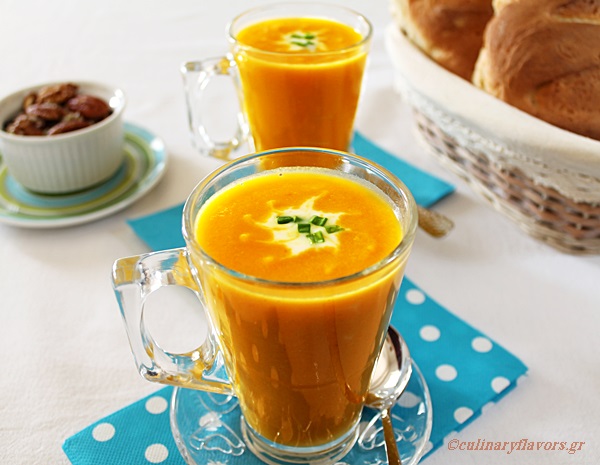Η συνταγή και στα ελληνικά στο τέλος της ανάρτησης!
Hippocrates was the father of modern medicine and was born in Kos island in 460 B.C. and died in Larisa in 377B.C. he managed to separate medicine from all the previous magic, superstitions and misbeliefs.
Hippocrates conducted experiments studied and collected data about diseases so as to prove that they are a natural process. He managed to show that the symptoms of a disease were merely the natural reactions of the body to the disease process. He, further, established that the main task of any physician was to help the immune system of the body to overcome the sickness and restore the metabolic imbalance caused by the disease. In that way the body could return to its former state of harmony and balance.

He founded basic medical principles and it was he who tried to heal using medicines from Mother Nature. He managed to bind the practical medicine with the principles of philosophy and humanitarianism and he became eternally known as the Father of Medicine.
He or one of his students wrote an oath that is used until today for medicine graduates to swear on as to what a modern physician should do while practicing his profession. He is definitely a role model and his life is a constant inspiration for doctors and all sorts of healers. I am giving you the modern version of the oath which is truly remarkable:

“I swear to fulfill, to the best of my ability and judgment, this covenant:
I will respect the hard-won scientific gains of those physicians in whose steps I walk, and gladly share such knowledge as is mine with those who are to follow.
I will apply, for the benefit of the sick, all measures which are required, avoiding those twin traps of overtreatment and therapeutic nihilism.
I will remember that there is art to medicine as well as science, and that warmth, sympathy, and understanding may outweigh the surgeon’s knife or the chemist’s drug.
I will not be ashamed to say “I know not,” nor will I fail to call in my colleagues when the skills of another are needed for a patient’s recovery.
I will respect the privacy of my patients, for their problems are not disclosed to me that the world may know. Most especially must I tread with care in matters of life and death. If it is given me to save a life, all thanks. But it may also be within my power to take a life; this awesome responsibility must be faced with great humility and awareness of my own frailty. Above all, I must not play at God.

I will remember that I do not treat a fever chart, a cancerous growth, but a sick human being, whose illness may affect the person’s family and economic stability. My responsibility includes these related problems, if I am to care adequately for the sick.
I will prevent disease whenever I can, for prevention is preferable to cure.
I will remember that I remain a member of society, with special obligations to all my fellow human beings, those sound of mind and body as well as the infirm.
If I do not violate this oath, may I enjoy life and art, respected while I live and remembered with affection thereafter. May I always act so as to preserve the finest traditions of my calling and may I long experience the joy of healing those who seek my help.
Written in 1964 by Louis Lasagna, Academic Dean of the School of Medicine at Tufts University, and used in many medical schools today.”

I am under the weather just like most of people these days here in Greece so I went back to those old days when all they had was natural products straight from the source. Carrot was used a lot in ancient Greece by Hippocrates for healing and so I thought that a carrot soup would be the best remedy for me and a good source of vitamins for my family. I will tell you one thing; my husband ate three plates, my son two and I only one. Both my boys were crying afterwards because the pot was empty and there were no leftovers for dinner. I will definitely be making it again, because it was pure heaven.
- 750 gr. / 27 oz. carrots, sliced
- 2 medium onions, chopped
- 1 scallion, sliced
- 4 cups chicken broth
- 2 garlic cloves, minced
- 4 cm / 1.5 to 2 in. fresh ginger root, minced
- Salt and pepper
- Olive oil for the sautéing
- 100 gr. / 3.5 oz. heavy whipping cream, beaten to form stiff picks
- 100 gr. / 3.5 oz. Greek yogurt
- 1 tsp honey
- In a deep pot add about 5 tbsp of olive oil and bring to low heat.
- Add the onions and cook until it becomes translucent.
- We don’t want it to take any color just to become transparent.
- Add the garlic and cook for a minute.
- Add the carrots, salt (about 1 tsp) and pepper and let them cook for couple of minutes.
- Pour 3 cups of the chicken broth and bring to boil.
- When the first big bubbles start to form, reduce heat to low and simmer until the carrots are cooked and soft about 30 minutes.
- With the hand blender mash everything inside the pot.
- Add the ginger and taste to see if it needs more salt or pepper.
- Now depends on you how you want the consistency of the soup.
- With the three cups it is thick but if you want it thinner you can add from ½ to 1 cup of the remaining broth.
- If you add broth return the pot to the stove and cook for another 2 minutes.
- To serve it, mix gently in a bowl the whipped cream, the yogurt and honey and put one dollop over every serving.
- You can garnish with chives or the green part of a scallion.
- 750 γρ. καρότα, κομμένα σε φέτες
- 2 μέτρια κρεμμύδια, ψιλοκομμένα
- 1 κρεμμυδάκι, κομμένο σε φέτες
- 4 φλ. ζωμό κοτόπουλου
- 2 σκελίδες σκόρδο, λιωμένες
- 4 cm φρέσκια ρίζα τζίντζερ, τριμμένη
- Αλάτι και πιπέρι
- Ελαιόλαδο για το σωτάρισμα
- 100 γρ. Κρέμα γάλακτος, χτυπημένη σε σαντιγύ
- 100 γρ. ελληνικό γιαούρτι
- 1 κ.γ. μέλι
- Σε μια βαθιά κατσαρόλα προσθέστε περίπου 5 κουταλιές της σούπας ελαιόλαδο και βάλτε τη σε χαμηλή φωτιά.
- Προσθέστε τα κρεμμύδια και μαγειρέψτε μέχρι να γίνουν διαφανή.
- Δεν θέλουμε να πάρουν χρώμα απλά να γίνουν διαφανή.
- Η διαδικασία αυτή λέγεται ίδρωμα των λαχανικών και γίνεται σε χαμηλή θερμοκρασία.
- Προσθέστε το σκόρδο και μαγειρέψτε για ένα λεπτό.
- Προσθέστε τα καρότα, αλάτι (περίπου 1 κουταλάκι του γλυκού) και πιπέρι και αφήστε να ιδρώσουν για μερικά λεπτά.
- Ρίξτε τα 3 φλιτζάνια από το ζωμό του κοτόπουλου και ανεβάστε τη θερμοκρασία ώστε να αρχίσει να βράζει.
- Όταν οι πρώτες φυσαλίδες αρχίζουν να βγαίνουν στην επιφάνεια, μειώστε τη θερμοκρασία σε χαμηλή και σιγοβράστε έως ότου τα καρότα να είναι μαγειρεμένα και μαλακά περίπου 30 λεπτά.
- Με το μπλέντερ χειρός πολτοποιήστε τα όλα μέσα στην κατσαρόλα ή μπορείτε να χρησιμοποιήσετε και μπλέντερ.
- Προσθέστε το τζίντζερ και δοκιμάστε για να δείτε αν χρειάζεται περισσότερο αλάτι ή πιπέρι.
- Τώρα εξαρτάται από εσάς πόσο αραιή ή πηχτή θέλετε να είναι η σούπα.
- Με τα τρία Κύπελλα είναι πηχτή, αλλά αν τη θέλετε πιο αραιή μπορείτε να προσθέσετε από ½ έως 1 φλυτζάνι από τον υπόλοιπο ζωμό.
- Εάν προσθέτετε ζωμό βάλτε την κατσαρόλα ξανά στην εστία και μαγειρέψτε για άλλα 2 λεπτά.
- Για να τη σερβίρουμε, ανακατέψτε απαλά σε ένα μπολ την κρέμα σαντιγί, το γιαούρτι και το μέλι και βάλτε από μία κουταλιά πάνω από κάθε σερβίρισμα.
- Μπορείτε να γαρνίρετε με το πράσινο μέρος από ένα φρέσκο κρεμμυδάκι ή λίγο σχοινόπρασο.


